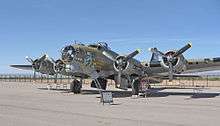Nine-O-Nine
| Nine-O-Nine | |
|---|---|
 | |
| The Collings Foundation B-17G flying in the colours of Nine-O-Nine, 323rd BS B-17G, displaying 1st Combat Bomb Wing tail markings | |
| Type | Boeing B-17G-30-BO Flying Fortress |
| Manufacturer | Boeing Airplane Company |
| Construction number | 7023 |
| Manufactured | December 15, 1943 |
| Serial | 42-31909 |
| Owners and operators | 91st Bomb Group USAAF |
| In service | December 15, 1943–December 7, 1945 |
| Total hours | 1,129 hours |
| Fate | Scrapped at Kingman, Arizona |
Nine-O-Nine was a Boeing B-17G-30-BO Flying Fortress heavy bomber, of the 323rd Bomb Squadron, 91st Bomb Group, that completed 140 combat missions during World War II, believed to be the Eighth Air Force record for most missions, without loss to the crews that flew it.
Service history
The original aircraft, a block 30 B-17G manufactured by Boeing, was nicknamed after the last three digits of her serial number: 42-31909. Nine-0-Nine was added to the USAAF inventory on December 15, 1943, and flown overseas on February 5, 1944. After depot modifications, she was delivered to the 91st BG at RAF Bassingbourn, England, on February 24, 1944, as a replacement aircraft, one of the last B-17s received in factory-applied camouflage paint.[1]
A former navigator of the 91st BG, Marion Havelaar, reported in his history of the group that Nine-O-Nine completed either 126 or 132 consecutive missions without aborting for mechanical reasons, also believed to be a record.[2] M/Sgt. Rollin L. Davis, maintenance line chief of the bomber, received the Bronze Star for his role in achieving the record.
Her first bombing raid was on Augsburg, Germany, on February 25, 1944. She made 18 bombing raids on Berlin. In all she flew 1,129 hours and dropped 562,000 pounds of bombs. She had 21 engine changes, four wing panel changes, 15 main gas tank changes, and 18 changes of Tokyo tanks (long-range fuel tanks).[3]
After the hostilities ceased in Europe, Nine-O-Nine was returned to the United States on June 8, 1945, and was consigned to the RFC facility at Kingman, Arizona on December 7, 1945, and eventually scrapped.
The Collings Foundation Nine-O-Nine

B-17G-85-DL, 44-83575, civil registration N93012, owned and flown by The Collings Foundation, Stow, Massachusetts, currently appears at airshows marked as the historic Nine-O-Nine.
The Collings Flying Fortress was built at Long Beach, CA by the Douglas Aircraft Company and accepted on April 7, 1945. Although she was too late for combat, #44-83575 did serve air-sea rescue duties as part of the Air/Sea 1st Rescue Squadron and later in the Military Air Transport Service.
In April 1952, #44-83575 was instrumented and subjected to the effects of three different nuclear explosions. After a thirteen-year "cool down" period, #44-83575 was sold as part of an 800-ton scrap pile and Aircraft Specialties Company began the restoration of the aircraft.
Damaged skin was fabricated and replaced on site; engines and props were stripped, cleaned, repaired, and tested; four thousand feet of new control cable was installed; all electrical wiring and instrumentation was replaced.
For twenty years, without a major problem or incident, #44-83575 served as a fire bomber dropping water and borate on forest fires. She was sold in January 1986 to the Collings Foundation. Restored back to her original wartime configuration by Tom Reilly Vintage Aircraft, she represented one of the finest B-17 restorations and won several awards.
Civilian crashes
On August 23, 1987, while performing at an airshow in the Pittsburgh suburban Beaver County Airport, N93012 ("Nine-O-Nine") was caught by a severe crosswind moments after touchdown. The right wing lifted in the air, finally coming down too far down the runway. Despite the efforts of her crew, she rolled off the end of the runway, crashed through a chain link fence, sheared off a power pole and roared down a 100-foot ravine to a thundering stop. The landing gear sheared off, the chin turret was smashed and pushed into the nose; the Plexiglass nose was shattered; bomb bay doors, fuselage, ball turret, wing and nacelles all took a tremendous beating. Engines and propellers were also torn from their mounts. Fortunately, there were no fatalities to the crew or riders although there were injuries.[4]
For a second time, N93012 (Nine-O-Nine) "rose from the ashes". With nacelles from the famed B-17 "Shoo Shoo Baby", thousands of volunteer hours at Air Heritage Aircraft Restoration Inc., support from the people of Beaver Falls, Pennsylvania, and donations from individuals and corporations, she was made whole again to carry on the proud and rugged heritage of the B-17.
Since the crash at Beaver County Airport N93012 (Nine-O-Nine) has succeeded in visiting over 1200 tour stops.
On July 9, 1995 N93012 (Nine-O-Nine) once again crashed, this time near Norfolk, Nebraska.[5]
| Wikimedia Commons has media related to Nine-O-Nine (B-17). |
References
- ↑ Havelaar, Marion H. (1995) The Ragged Irregulars of Bassingbourn: The 91st Bombardment Group in World War II. Schiffer Military History. ISBN 0-88740-810-9 p.185
- ↑ Havelaar, pp. 190 and 130, respectively
- ↑ "History of the B-17 Nine O Nine". www.collingsfoundation.org. 2001. Retrieved 16 January 2007.
- ↑ http://www.91stbombgroup.com/Ragged_Irregular/RI_1995_Oct_V28_N4.pdf
- ↑ http://www.91stbombgroup.com/Ragged_Irregular/RI_1995_Oct_V28_N4.pdf
External links
| Wikimedia Commons has media related to B-17 Flying Fortress. |
| Wikiquote has quotations related to: B-17 Flying Fortress |
- Spherical panoramas over, under, around and through the Collings Foundation B-17G, 'Nine-O-Nine'.
- Boeing B-17 Flying Fortress - Jay Leno's Garage